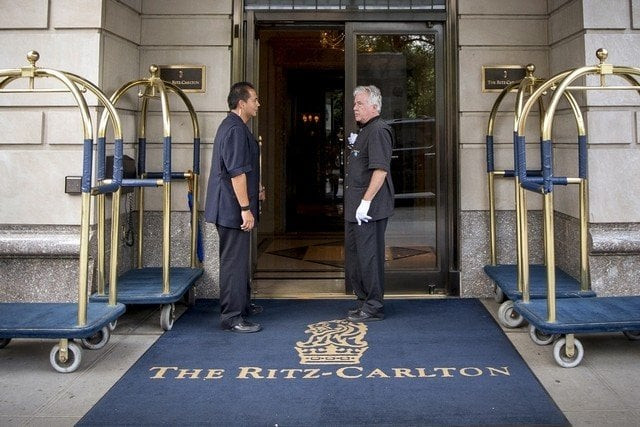
The expansion of “halal tourism” can be seen in the tourist industry with companies hoping to increase revenues, following in the footsteps of Saudi Arabia that generates a multi-billion dollar revenue stream with Muslims travelling to Makkah.
Such initiatives include an Orlando-based company offering “halal vacation homes” with curtained pool decks and rooms equipped with prayer mats and copies of the Holy Quran. Further, a Boston based developer’s app offers travel guides for 90 cities with local prayer times and a compass pointing towards the Kaabah for daily prayers, while a British company’s app called ‘Halal Gems’ lists restaurants serving halal meat in London and Dubai.
According to a 2014 study for the travel tech company Amadeus, travelers from Saudi Arabia, Kuwait, Qatar, the United Arab Emirates, Bahrain and Oman will spend $64 billion traveling this year and are expected to spend a whopping $216 billion by 2030. The study also found that, on average, a traveler from these countries spends around $9,900 per trip outside the Gulf. For Emiratis, the figure reaches $10,400.
Reem El Shafaki, a senior associate of an advisory firm, Dinar Standard, applauded Ritz Carlton hotels in Dallas and New York for serving as a good example of what hotels are doing to cater to their Muslim guests. In addition to providing halal meals upon request, the hotels also have Middle Eastern chefs on staff and offer rooms with spaces that allow for gender segregated settings.
The advisory firm has carried out webinars for Marriott hotel staff to guide them on how to cater to Muslim guests. El Shafaki says the hospitality industry can also market to Muslims without alienating non-Muslims. "What some hotels and destinations are doing is that they're using the term 'family friendly'," she said at a conference this week in Abu Dhabi.
At the World Halal Travel Summit, Roberto Silva of Florida Reality Investments said, "I would love to do more ... Los Angeles and San Diego, there are a lot of people going there, and also New York."
A resort in Turkey has built a structure in the sea to shield women from the view of men and some have bought private beaches for Muslim women. Malaysia is also promoting itself as a "Muslim-friendly Malaysia" in brochures and creating a more comfortable environment for Muslim travelers.
Speed dating goes 'halal' in Muslim-majority Malaysia
‘Halal booking’ is a website that can filter requests to find hotels that do not serve any alcohol, or hotels that only serve alcohol in some restaurants. Chairman of the website, Elnur Seyidli, says his company has served 43,000 customers from 75 countries.
He told the audience at the summit, "It's about permissibility... Nothing is 100% halal in my opinion and nothing is 100% non-halal. Even for individual travelers for different trips, requirements may change."
Irfan Ahmad has also tapped into the market with his app, Irhal. It covers 90 cities worldwide, ranging from Amsterdam and Athens to Beijing and Bangkok, as well as US cities like Los Angeles, Chicago, Houston, New York and Washington DC. The success of such apps which includes maps for mosques and halal restaurants is highlighted through its over 25,000 downloads. Ahmad is looking for around $1 million in investment to expand and include more cities.
Top 10 most popular destinations for Muslim travelers
"Just like any startup, one of the biggest challenges is funding ourselves," he said. "We've been able to fund the entire project on our own by bootstrapping."
This article originally appeared on The Jakarta Post.


















COMMENTS
Comments are moderated and generally will be posted if they are on-topic and not abusive.
For more information, please see our Comments FAQ